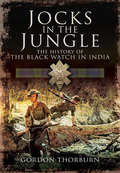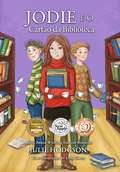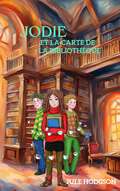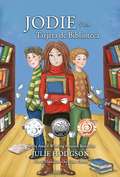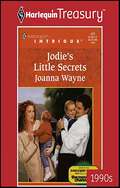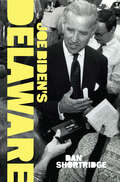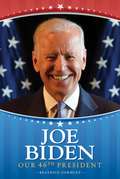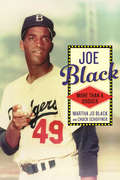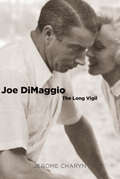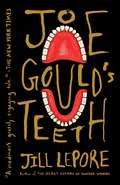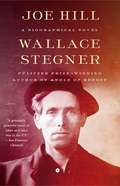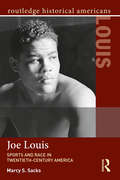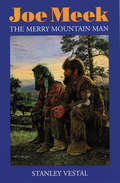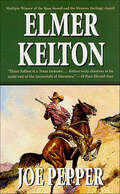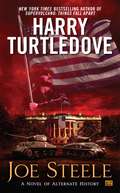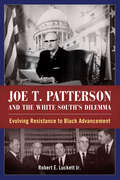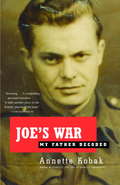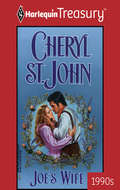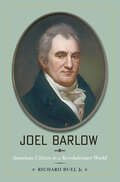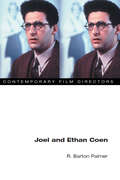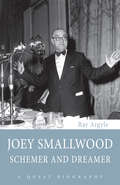- Table View
- List View
Jocks in the Jungle: The History of the Black Watch in India
by Gordon Thorburn"In 1943, there was no thought of good times for two battalions of Scottish soldiers. For them, India meant a new and unimaginably arduous kind of training. Some of the Black Watch boys had seen action in Somaliland, Crete and Tobruk. Some of the Cameronians had fought the Japs in the Burma retreat. Even for these, such training was trial by ordeal. Many more of the Jocks were new, just shipped out from Scotland, but all of them were ordinary men, men from the towns and villages whod taken the Kings shilling in their countrys peril. These were first-class British infantry, but not the super-selected special forces types that we know today. Nevertheless, it was a special-forces job they were supposed to do and that is what they were called, Special Force. The challenge in Madhya Pradesh was to turn themselves into jungle fighters as good as the Japanese. They had a few short months to become Chindits. The two brigades they joined numbered 7,677 officers and men going into the jungle, of whom 531 were killed, captured or missing, and around 1,600 were wounded. By the end, some 3,800 were too sick to fight. Only 1,754 could be classified as 'effective' when they came out and, in truth, half of those were fit for no more than a hospital bed. It was a miracle anybody survived at all. And that was just two of the five brigades that went in. Was this the greatest medical disaster of World War Two? Who caused it? This new book has the answers."
Jodie e la tessera della biblioteca (Le avventure di Jodie Broom #1)
by Julie HodgsonUn’appassionante avventura in giro per il tempo e per la storia. Vincitore del Readers’ Favorite Award. Jodie Broom è una ragazza di 12 anni (quasi 13!). Come la maggior parte delle ragazze della sua età, ama la musica, i suoi amici, ed è sempre pronta per una nuova avventura. Ma ciò che adora più di ogni altra cosa sono i libri. Legge e colleziona qualunque testo possa soddisfare la sua fame di storie, personaggi e informazioni. Purtroppo, Jodie vive nel 2075. Sono passati ormai cinquant’anni da quando i libri sono stati dichiarati illegali, insieme a ogni altro oggetto cartaceo. In questo mondo digitale, le esperienze sono in larga parte simulate, dal cibo sintetico allo zoo che mostra solo filmati di specie estinte. Grazie alla sua tessera della biblioteca, che le permette di viaggiare nel tempo, Jodie scopre di poter assistere a eventi storici memorabili e incontrare personaggi leggendari, riportando di volta in volta a casa libri preziosi da aggiungere alla sua collezione segreta. Ma i viaggi nel tempo hanno anche i loro rischi… Accompagnata dai suoi amici, Jodie si imbarcherà nell’avventura più incredibile della sua vita, fra momenti emozionanti e continui colpi di scena.
Jodie e o cartão da biblioteca
by Julie Hodgson Thamires Silva AraujoJodie Broom, uma garota de 12 anos (quase 13!), é como quase todas as garotas da idade dela. Ela ama seus amigos, música e está sempre pronta para uma boa aventura. O que ela valoriza acima de tudo são os livros e ela só pensa neles, lendo e colecionando tudo o que ela pode para satisfazer sua apetite voraz por histórias, fatos e História. Mas Jodie vive no ano de 2075, e mais de cinquenta anos passaram desde que livros e papel foram proibidos; é uma época em que ninguém pode ter um livro e nem mesmo fotografias impressas. Nesse e-Mundo, as experiências são amplamente simuladas, desde os alimentos reconstituídos até o zoológico que só mostra filmes de todas as espécies extintas. Com seu cartão da biblioteca de estudante, que dá a ela a habilidade de viajar no tempo, Jodie descobre que ela e seus amigos podem presenciar eventos históricos e encontrar personagens legendários. Ela também descobre que pode encontrar e levar para casa seus preciosos livros e mantê-los em segurança em seu esconderijo secreto.
Jodie et la carte de la bibliothèque (Jodie Broom #1)
by Julie HodgsonJodie Broom, une fille de 12 ans (presque 13 ans!), Ressemble à la plupart des filles de son âge. Elle aime ses amis, la musique et est toujours prête pour une bonne aventure. Ce qu’elle aime par-dessus tout, ce sont les livres et elle est consumée par eux, lisant et rassemblant tout ce qu’elle peut pour satisfaire son appétit vorace pour des récits, des faits et l'histoire. Mais Jodie vit en 2075 et plus de cinquante ans se sont écoulés depuis l’interdiction des livres et du papier; c'est un temps où personne ne peut posséder un livre imprimé, ni même imprimer des photographies. Dans ce monde virtuel, les expériences sont largement simulées, de la nourriture reconstituée au zoo qui ne montre que des films de toutes les espèces éteintes. Grâce à sa carte d'étudiant, qui lui permet de voyager dans le temps, Jodie découvre qu'elle et ses amis peuvent vivre des événements historiques et rencontrer des personnages légendaires. Elle peut également retrouver et ramener chez elle ses précieux livres afin de les protéger dans sa cachette secrète.
Jodie y la Tarjeta de Biblioteca
by Betty Serrano Julie HodgsonJodie Broom, una jovencita de 12-años (¡casi 13!), es como la mayoría de las jovencitas de su edad. Ama a sus amigos, su música, y siempre lista para una aventura. Lo que más atesora sobre todas las cosas son sus libros y los necesita, leer y coleccionar todo lo necesario para satisfacer su apetito voraz de leer cuentos, hechos, e historia. Pero Jodie vive en el año 2075, y más de cincuenta años han pasado desde la prohibición de los libros y el papel impreso; es una época donde nadie puede tener un libro impreso, o imprimir fotografías. En este E-mundo, las experiencias son ampliamente simuladas, desde la comida reconstituida hasta el zoológico que solamente muestra filmaciones de las especies de animales en peligro de desaparecer. Con su tarjeta de biblioteca, tiene la habilidad de viajar en el tiempo, y Jodie descubre que ella y sus amigos pueden experimentar eventos en la historia y conocer personajes legendarios, y pueden también encontrar y traer consigo libros valiosos y guardarlos en un lugar secreto y asegurarse de tenerlos a salvo.
Jodie's Little Secrets
by Joanna WayneSECRET DADDYJodie Gahagen was content being a single mom to her twin baby boys. But her ordered life was shattered by a stalker whose threat sent her packing home-with her bags and more than a couple of secrets.She'd told the town her "husband" couldn't make it, that things were fine whenever she overreacted. Except there was no avoiding Ray Kostner-the one man she couldn't deny. He read her instinctively, knew she was hiding the truth...and that she still loved him. But Ray never guessed he was a father.Now the stalker didn't have a chance.
Joe Biden's Delaware (History & Guide)
by Dan Shortridge"Delaware will be written on my heart." In 1972, a young Delaware attorney made an audacious bet, challenging the state's most formidable politician in a race for the US Senate. Joe Biden won that election at age twenty-nine, but weeks later, his wife and daughter died in a car crash that also injured his two sons. This is the story of Delaware's preeminent political leader, his family and their journey over the decades since. From the Charcoal Pit to the Hotel DuPont, St. Joseph's on the Brandywine to the Wilmington train station, these tales reveal Joe Biden's deep roots in Delaware and how they helped carry him to the White House. Author Dan Shortridge examines Biden family lore and traces the history of the institutions that shaped their lives and the First State.
Joe Biden: Our 46th President
by Beatrice GormleyA biography of Joe Biden, the 46th President of the United States: from childhood through the Senate to his election as vice president and, in 2020, as president.The road to the presidency of the United States was a long—and determined—one for Joseph Robinette Biden, Jr. From Joe&’s childhood in Scranton, Pennsylvania, and Wilmington, Delaware, his close-knit, devoted family gave him the foundation that would guide him through life. His family&’s unwavering support bolstered Joe when he was bullied for stuttering, attended law school, and became a public defender. They encouraged Joe when he pursued a career in politics and became the sixth youngest senator in US history. They consoled him when he suffered the devastating loss of his first wife and baby daughter and years later the death of his eldest son, Beau. And they cheered Joe when he served two vice presidential terms with President Barrack Obama. After a lifetime marked by perseverance, integrity, and accomplishment, Joe Biden and running mate, Kamala Harris, won the 2020 presidential election. And standing by his side each and every step of the way was his wife Jill, his children, and his grandchildren—his family.
Joe Black: More than a Dodger
by Martha Jo Black Chuck SchoffnerHe was told that the color of his skin would keep him out of the big leagues, but Joe Black worked his way up through the Negro Leagues and the Cuban Winter League. He burst into the Majors in 1952 when he signed with the Brooklyn Dodgers. In the face of segregation, verbal harassment, and even death threats, Joe Black rose to the top of his game; he earned National League Rookie of the Year and became the first African American pitcher to win a World Series game. With the same tenacity he showed in his baseball career, Black became the first African American vice president of a transportation corporation when he went to work for Greyhound. In this first-ever biography of Joe Black, his daughter Martha Jo Black tells the story not only of a baseball great who broke through the color line, but also of the father she knew and loved.
Joe DiMaggio: The Long Vigil
by Jerome CharynAs the New York Yankees' star centerfielder from 1936 to 1951, Joe DiMaggio is enshrined in America's memory as the epitome in sports of grace, dignity, and that ineffable quality called "class." But his career after retirement, starting with his nine-month marriage to Marilyn Monroe, was far less auspicious. Writers like Gay Talese and Richard Ben Cramer have painted the private DiMaggio as cruel or self-centered. Now, Jerome Charyn restores the image of this American icon, looking at DiMaggio's life in a more sympathetic light. DiMaggio was a man of extremes, superbly talented on the field but privately insecure, passive, and dysfunctional. He never understood that for Monroe, on her own complex and tragic journey, marriage was a career move; he remained passionately committed to her throughout his life. He allowed himself to be turned into a sports memorabilia money machine. In the end, unable to define any role for himself other than "Greatest Living Ballplayer," he became trapped in "a horrible kind of minutia. "But where others have seen little that was human behind that minutia, Charyn in Joe DiMaggio presents the tragedy of one of American sports' greatest figures.
Joe Gould's Teeth
by Jill LeporeFrom New Yorker staff writer and Harvard historian Jill Lepore, the dark, spellbinding tale of her restless search for the long-lost, longest book ever written, a century-old manuscript called "The Oral History of Our Time." Joe Gould, a madman, believed he was the most brilliant historian of the twentieth century. So did some of his friends, a group of modernist writers and artists that included E. E. Cummings, Marianne Moore, William Carlos Williams, John Dos Passos, and Ezra Pound. Gould began his life's work before the First World War, announcing that he intended to write down nearly everything anyone ever said to him. "I am trying to preserve as much detail as I can about the normal life of every day people," he explained, because "as a rule, history does not deal with such small fry." By 1942, when The New Yorker published a profile of Gould written by the reporter Joseph Mitchell, Gould's manuscript had grown to more than nine million words. But when Gould died in 1957, in a mental hospital, the manuscript was nowhere to be found. Then, in 1964, in "Joe Gould's Secret," a second profile, Mitchell claimed that "The Oral History of Our Time" had been, all along, merely a figment of Gould's imagination. Lepore, unpersuaded, decided to find out. Joe Gould's Teeth is a Poe-like tale of detection, madness, and invention. Digging through archives all over the country, Lepore unearthed evidence that "The Oral History of Our Time" did in fact once exist. Relying on letters, scraps, and Gould's own diaries and notebooks--including volumes of his lost manuscript--Lepore argues that Joe Gould's real secret had to do with sex and the color line, with modernists' relationship to the Harlem Renaissance, and, above all, with Gould's terrifying obsession with the African American sculptor Augusta Savage. In ways that even Gould himself could not have imagined, what Gould wrote down really is a history of our time: unsettling and ferocious.From the Hardcover edition.
Joe Hill: A Biographical Novel
by Wallace StegnerBlending fact with fiction in this masterful historical novel, National Book Award and Pulitzer Prize winner Wallace Stegner retells the story of Joe Hill--the Wobbly bard who became the stuff of legend when, in 1915, he was executed for the alleged murder of a Salt Lake City businessman. Organizer, agitator, "Labor's Songster"--a rebel from the skin inwards, with an absolute faith in the One Big Union--Joe Hill fought tirelessly in the frequently violent battles between organized labor and industry. But though songs and stories still vaunt him, and his legend continues to inspire those who feel the injustices he fought against, Joe Hill may not have been a saintly crusader and may have been motivated by impulses darker than the search for justice. Joe Hill is a full-bodied portrait of both the man and the myth: from his entrance into the short-lived Industrial Workers of the World union, the most militant organization in the history of American labor, to his trial, imprisonment, and final martyrdom. His famous last words: "Don't waste time mourning. Organize."
Joe Louis: Sports and Race in Twentieth-Century America (Routledge Historical Americans)
by Marcy S. SacksThis insightful study offers a fresh perspective on the life and career of champion boxer Joe Louis. The remarkable success and global popularity of the "Brown Bomber" made him a lightning rod for debate over the role and rights of African Americans in the United States. Historian Marcy S. Sacks traces both Louis’s career and the criticism and commentary his fame elicited to reveal the power of sports and popular culture in shaping American social attitudes. Supported by key contemporary documents, Joe Louis: Sports and Race in Twentieth-Century America is both a succinct introduction to a larger-than-life figure and an essential case study of the intersection of popular culture and race in the mid-century United States.
Joe Meek: The Merry Mountain Man, A Biography
by Stanley Vestal"A tall man, with long black hair, smooth face, dark eyes (inclining to turn his head a little to one side, as much as to say, 'I can tell you about it'), a harum-scarum, don't-care sort of man, full of life and fun. That's how a contemporary described Joe Meek." <p><p> Born in Virginia, Joe Meek became a trapper, Indian fighter, pioneer, peace officer, frontier politician, and lover of practical jokes and Jacksonian democracy. He was a boon companion to two other larger-than-life mountain men, Kit Carson and Jim Bridger, and just as important in frontier history. <p> In 1829, our nineteen-year-old hero joined the Rocky Mountain Fur Company of Jedediah Smith and the Sublettes and headed west on an odyssey of hair-raising high adventure and hilarious low comedy. For the next twelve years, the Rockies rang with tales of Joe's wild exploits. After the Last Rendezvous in 1840, he helped drive the first wagons to Oregon, served in the legislature of the provisional government, and went to Washington as a special envoy to President Polk. He later returned to Oregon to live out his days in the community that he helped build.
Joe Pepper: Two Complete Novels Of The American West (Tales of Texas)
by Elmer KeltonA Texas outlaw recounts his dramatic life story in this classic historical Western from the multiple Spur Award–winning author.Joe Pepper is a Texas badman with quite a past. In fact, there isn’t much that Joe hasn’t done in his forty years of living on both sides of the Texas law—except face the hangman.Now, convicted of murder, Joe is about to get that privilege. But before he goes, Joe has a few things he wants to say-and a few stories that he wants to set straight. This is Joe’s final confession, given without embellishment—or apology.With Joe Pepper, legendary Western writer Elmer Kelton tells a moving tale of one man’s frontier life, and the history of his home state of Texas.
Joe Salsberg
by Gerald TulchinskyThis book follows the life and intellectual journey of Joseph Baruch Salsberg, a Polish-Jewish immigrant who became a major figure of the Ontario Left, a leading voice for human rights in the Ontario legislature, and an important journalist in the Jewish community. His life trajectory mirrored many of the most significant transformations in Canadian political and social life in the twentieth century.Award-winning historian Gerald Tulchinsky traces Salsberg's personal and professional journey - from his entrance into Toronto's oppressive garment industry at age 14, which led to his becoming active in emerging trade unions, to his rise through the ranks of the Communist Party of Canada and the Workers' Unity League. Detailing Salsberg's time as an influential Toronto alderman and member of the Ontario legislature, the book also examines his dramatic break with communism and his embrace of a new career in journalism.Tulchinsky employs historical sources not used before to explain how Salsberg's family life and surrounding religious and social milieu influenced his evolution as a Zionist, an important labour union leader, a member of the Communist Party of Canada, and a prominent member of Toronto's Jewish community.
Joe Steele
by Harry TurtledoveNew York Times bestselling author Harry Turtledove's thought-provoking forays into the past have produced such intriguing "what-if" novels as Ruled Britannia, Days of Infamy, and Opening Atlantis. Now "the maven of alternate history" (The San Diego Union-Tribune) envisions the election of a United States President whose political power will redefine what the nation is--and what it means to be American.... President Herbert Hoover has failed America. The Great Depression that rose from the ashes of the 1929 stock market crash still casts its dark shadow over the country. Despairing and desperate, the American people hope one of the potential Democratic candidates--New York governor Franklin D. Roosevelt and California congressman Joe Steele--can get the nation on the road to recovery. But fate snatches away one hope when a mansion fire claims the life of Roosevelt, leaving the Democratic party little choice but to nominate Steele, son of a Russian immigrant laborer who identifies more with the common man than with Washington D.C.'s wealthy power brokers. Achieving a landslide victory, President Joe Steele wastes no time pushing through Congress reforms that put citizens back to work. Anyone who gets in his way is getting in the way of America, and that includes the highest in the land. Joe Steele's critics may believe the government is gaining too much control, but they tend to find themselves in work camps if they make too much noise about it. And most people welcome strong leadership, full employment, and an absence of complaining from the newspapers--especially as Hitler and Trotsky begin the kind of posturing that seems sure to drag America into war.
Joe T. Patterson and the White South's Dilemma: Evolving Resistance to Black Advancement
by Robert E. Luckett Jr.As Mississippi's attorney general from 1956 to 1969, Joe T. Patterson led the legal defense for Jim Crow in the state. He was inaugurated for his first term two months before the launch of the Sovereignty Commission—charged “to protect the sovereignty of Mississippi from encroachment thereon by the federal government”—which made manifest a century-old states' rights ideology couched in the rhetoric of massive resistance. Despite the dubious legal foundations of that agenda, Patterson supported the organization's mission from the start and served as an ex-officio leader on its board for the rest of his life. Patterson was also a card-carrying member of the segregationist Citizens' Council and, in his own words, had “spent many hours and driven many miles advocating the basic principles for which the Citizens' Councils were originally organized.” Few ever doubted his Jim Crow credentials. That is until September 1962 and the integration of the University of Mississippi by James Meredith. That fall Patterson stepped out of his entrenchment by defying a circle of white power brokers, but only to a point. His seeming acquiescence came at the height of the biggest crisis for Mississippi's racist order. Yet even after the Supreme Court decreed that Meredith must enter the university, Patterson opposed any further desegregation and despised the federal intervention at Ole Miss. Still he faced a dilemma that confronted all white southerners: how to maintain an artificially elevated position for whites in southern society without resorting to violence or intimidation. Once the Supreme Court handed down its decision in Meredith v. Fair, the state attorney general walked a strategic tightrope, looking to temper the ruling's impact without inciting the mob and without retreating any further. Patterson and others sought pragmatic answers to the dilemma of white southerners, not in the name of civil rights but to offer a more durable version of white power. His finesse paved the way for future tactics employing duplicity and barely yielding social change while deferring many dreams.
Joe's War: My Father Decoded
by Annette KobakThe intriguing history of a young girl's search for the man her father really was. A fascinating insight about WWII espionage - and a moving personal story.
Joe's Wife
by Cheryl St. JohnMEMORIES...Tye Hatcher returned to Aspen Grove to find that life in the sleepy Western town hadn't changed much. The townspeople stubbornly refused to see the man he had become. That is, everybody but Meg Telford. Meg definitely took notice of the reticent rancher and gave him a chance in life when no one else would. Still, Meg clung to the memories of her late husband, afraid of the feelings Tye aroused in her heart. And though Tye vowed to prove his worth to the town, could he ever prove to Meg that he was worthy of her love?
Joel Barlow: American Citizen in a Revolutionary World
by Richard . Buel Jr.An in-depth look at the life and times of the early American poet and polemicist.Poet, republican, diplomat, and entrepreneur, Joel Barlow filled many roles and registered impressive accomplishments. In the first biography of this fascinating figure in decades, Richard Buel Jr. recounts the life of a man more intimately connected to the Age of Revolution than perhaps any other American.Barlow was a citizen of the revolutionary world, and his adventures throughout the United States and Europe during both the American and French Revolutions are numerous and notorious. From writing his epic poem, The Vision of Columbus, to plotting a republican revolution in Britain to negotiating the release of American sailors taken captive by Barbary pirates, Joel Barlow personified the true spirit of the tumultuous times in which he lived.No one witnessed more climactic events or interacted with more significant people than Joel Barlow. His unique vision, his unfailing belief in republicanism, and his entrepreneurial spirit drove him to pursue the revolutionary ideal in a way more emblematic of the age than the lives of many of its prominent heroes.In telling Barlow’s story, Buel explores the cultural landscape of the early American republic and engages the broader themes of the Age of Revolution. Few books explore in such a comprehensive fashion the political, economic, ideological, diplomatic, and technological dimensions of this defining moment in world history.“No earlier biographer has given nearly as detailed and rich a portrait of Barlow’s perhaps singularly expansive role in the cultural life, commerce, politics, and intrigue of the age of revolution.” —TheGuardian (UK)
Joel Barlow: American Citizen in a Revolutionary World
by Richard Buel Jr.Poet, republican, diplomat, and entrepreneur, Joel Barlow filled many roles and registered impressive accomplishments. In the first biography of this fascinating figure in decades, Richard Buel Jr. recounts the life of a man more intimately connected to the Age of Revolution than perhaps any other American.Barlow was a citizen of the revolutionary world, and his adventures throughout the United States and Europe during both the American and French Revolutions are numerous and notorious. From writing his epic poem, The Vision of Columbus, to plotting a republican revolution in Britain to negotiating the release of American sailors taken captive by Barbary pirates, Joel Barlow personified the true spirit of the tumultuous times in which he lived.No one witnessed more climactic events or interacted with more significant people than Joel Barlow. It was his unique vision, his unfailing belief in republicanism, and his entrepreneurial spirit that drove Barlow to pursue the revolutionary ideal in a way more emblematic of the age than the lives of many of its prominent heroes.Buel is a knowledgeable guide, and in telling Barlow’s story he explores the cultural landscape of the early American republic and engages the broader themes of the Age of Revolution. Few books explore in such a comprehensive fashion the political, economic, ideological, diplomatic, and technological dimensions of this defining moment in world history.
Joel and Ethan Coen (Contemporary Film Directors)
by R. Barton PalmerWith landmark films such as Fargo, O Brother Where art Thou?, Blood Simple, and Raising Arizona, the Coen brothers have achieved both critical and commercial success. Proving the existence of a viable market for "small" films that are also intellectually rewarding, their work has exploded generic conventions amid rich webs of transtextual references. R. Barton Palmer argues that the Coen oeuvre forms a central element in what might be called postmodernist filmmaking. Mixing high and low cultural sources and blurring genres like noir and comedy, the use of pastiche and anti-realist elements in films such as The Hudsucker Proxy and Barton Fink clearly fit the postmodernist paradigm. Palmer argues that for a full understanding of the Coen brothers' unique position within film culture, it is important to see how they have developed a new type of text within general postmodernist practice that Palmer terms commercial/independent. Analyzing their substantial body of work from this "generic" framework is the central focus of this book.
Joey Smallwood: Schemer and Dreamer
by Ray ArgyleKnown as the "only living Father of Confederation" in his lifetime, Joey Smallwood was an entertaining, crafty, and controversial politician in Canada for decades. Born in Gambo, Newfoundland, Joseph ("Joey") Smallwood (1900–1991) spent his life championing the worth and potential of his native province. Although he was a successful journalist and radio personality, Smallwood is best known for his role in bringing Newfoundland into Confederation with Canada in 1949, believing that such an action would secure an average standard of living for Newfoundlanders. He was rightfully dubbed the "only living Father of Confederation" in his lifetime and was premier of the province for twenty-three years. During much of the last part of the twentieth century, Smallwood remained a prominent player in the story of Newfoundland and Labrador’s growth as a province. Later in life he put himself in debt in order to complete his Encyclopedia of Newfoundland and Labrador, the only project of its kind in Canada up to that point. In Joey Smallwood: Schemer and Dreamer, Ray Argyle reexamines the life of this incredible figure in light of Newfoundland’s progress in recent years, and measures his vision against its new position as a province of prosperity rather than poverty.
